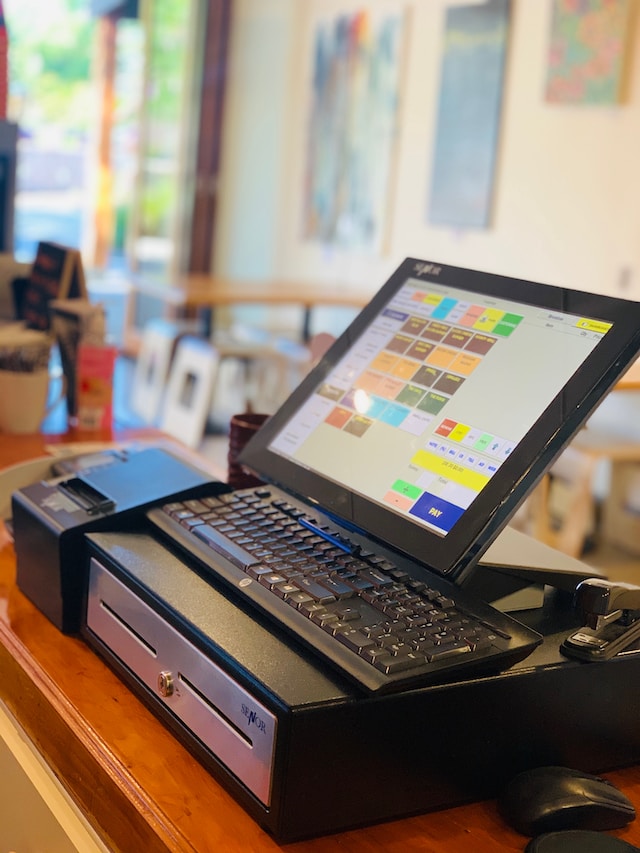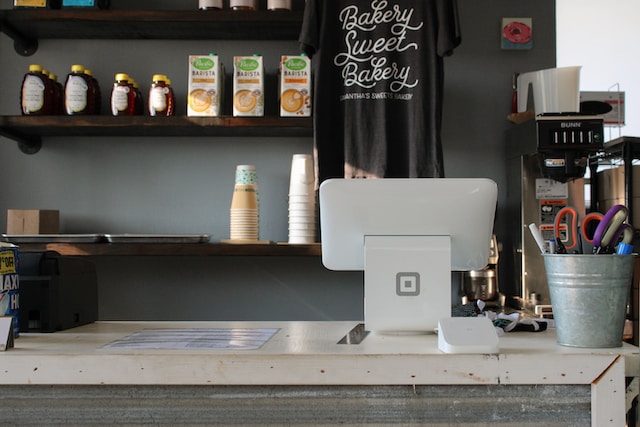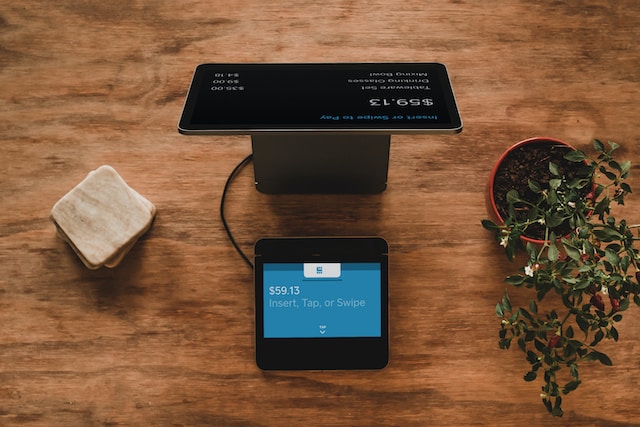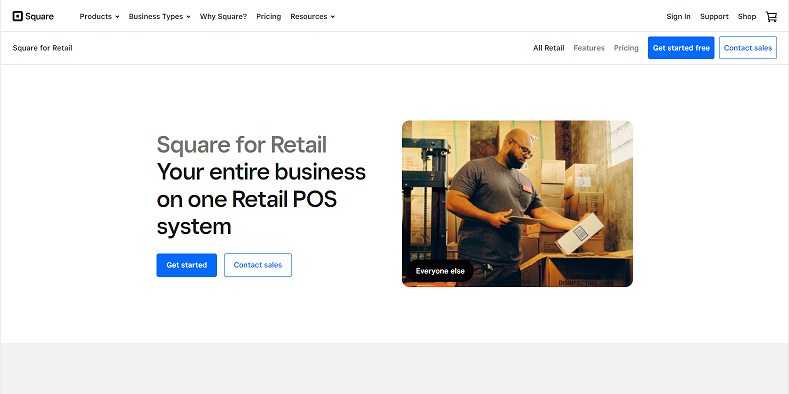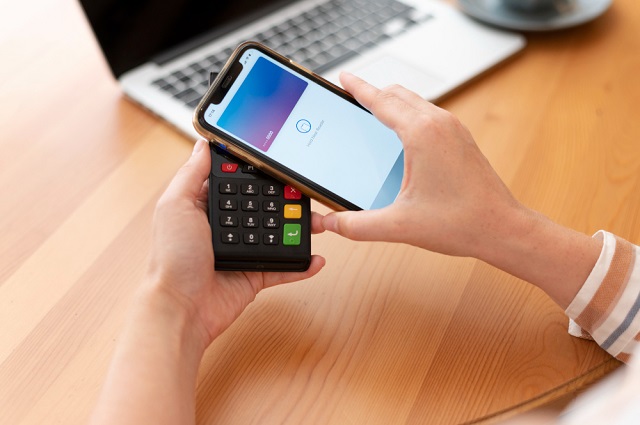
8 Best Retail POS Systems 2023
Choose the right POS Software for your business
How to evaluate a retail POS system effectively

Assess Business Needs
Identify your specific retail needs, such as inventory management, sales reporting, and customer relationship management. Consider factors like the size of your store, the type of products you sell, and your growth plans.

Compare Features and Costs
Research retail POS systems and compare their features, pricing, and scalability. Look for essential features like payment processing, barcode scanning, and integration capabilities. Evaluate the total cost of ownership, including hardware, software, and ongoing fees.

Request Demos and User Feedback
Request demonstrations from POS providers to see how their systems work in real time. Additionally, seek feedback from other retail businesses that have used the systems you’re considering. User reviews and testimonials can provide valuable insights into ease of use.
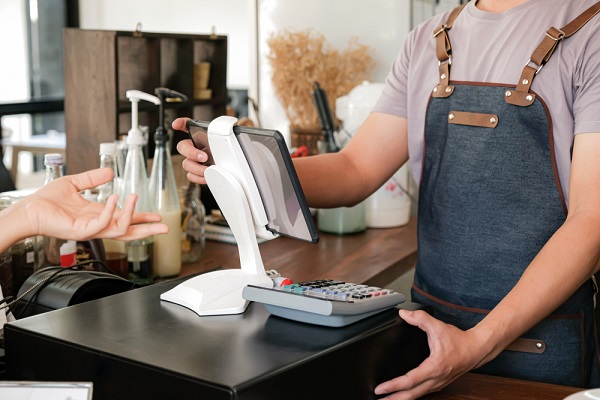
Our Goal
Looking for the best POS systems for your retail business? We’ll dive into the top retail POS systems that can revolutionize your retail operations in 2023. A reliable POS system is like a power-packed tool that streamlines your sales process, tracks inventory, and provides valuable analytics to help you make informed business decisions.
With the right POS system onboarded you can enhance customer experiences with seamless transactions and personalized services. From intuitive display interfaces to advanced analytics capabilities, these systems offer a range of features tailored to meet the unique needs of retail businesses. Whether you’re a small boutique or a large-scale retailer, we’ll explore different types of POS systems worth considering.
Stay ahead of the curve by staying updated with the latest trends and advancements in retail POS technology. So, let’s dive in and discover which POS system will elevate your retail business to new heights.
What is a retail POS?
A retail point-of-sale (POS) system is a software and hardware combination that enables businesses to process sales transactions quickly and efficiently. It is the central hub for managing inventory, tracking sales, and processing payments in retail stores. With a retail POS system, retailers can streamline their operations, enhance customer experience, and gain valuable insights into their business performance.
Understand the concept of a retail POS system
A retail POS system is more than just a cash register. It encompasses a range of features designed to simplify and automate various aspects of running a retail business. These systems typically include barcode scanners, receipt printers, cash drawers, and touch-screen monitors. They also integrate with tools like inventory management software and customer relationship management (CRM) systems.
Learn how a retail POS system streamlines sales transactions
One of the primary functions of a retail POS system is to facilitate smooth and efficient sales transactions. When customers make purchases at the checkout counter, the cashier simply scans the items’ barcodes using the barcode scanner connected to the POS terminal. The system then calculates the total amount due, applies any discounts or promotions, and generates an itemized receipt for the customer. This streamlined process reduces human error and saves time for both customers and staff.
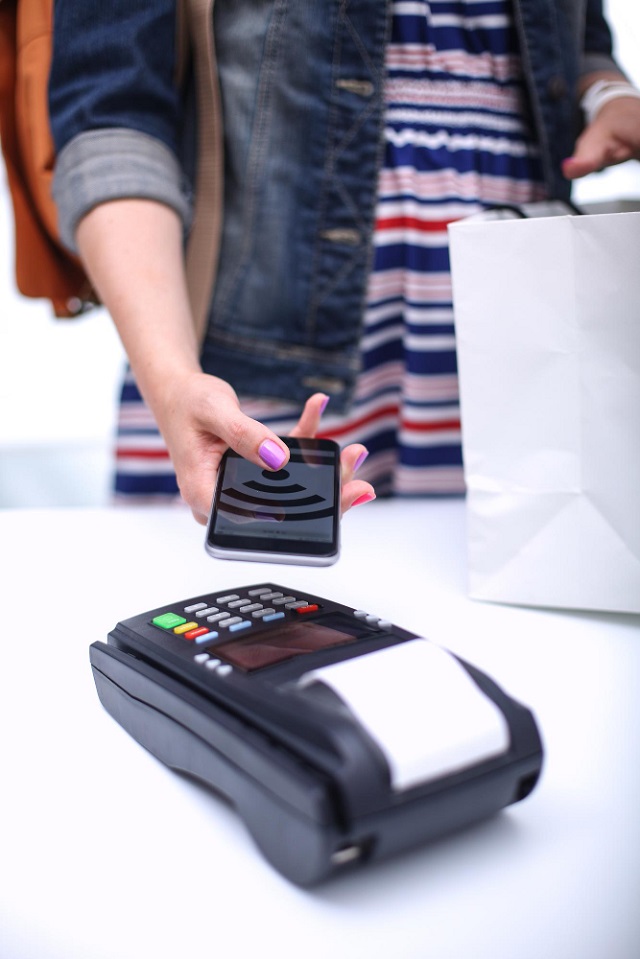
How to choose a retail POS system
There are several important factors to consider. Let’s explore these factors and learn how to choose a retail POS system that suits your needs.
Important Factors to Consider
When choosing a retail POS system, assessing various factors impacting its effectiveness for your business is crucial. Here are some key considerations:
- Type of Retail POS Systems: Familiarize yourself with the available retail POS systems. Options include cloud-based systems, traditional on-premise solutions, and mobile-based systems. Each has its advantages and limitations, so understanding their features is essential.
- Business Needs Assessment: Evaluate your business requirements and identify what features you need from a retail POS system. Consider aspects such as inventory management, sales reporting, employee management, customer relationship management (CRM), and integration capabilities with other software or hardware.
- Scalability: Think about the future growth potential of your business. Choose a retail POS system that can accommodate expanding operations without significant changes or upgrades.
- Cost: Determine your budget for a retail POS system and compare different providers’ pricing models. While price is essential, it should not be the sole determining factor in your decision-making process.
- Integrations: Check if the retail POS system integrates seamlessly with other tools you use in your business ecosystem. For example, if you rely on accounting software or e-commerce platforms, ensure compatibility between these systems to streamline operations.
- Customer Support: Look for a provider that offers reliable customer support services whenever you encounter issues or have questions regarding their retail POS system usage.
Matching Business Needs with Suitable Options
Once you have assessed these essential factors, it’s time to match your business needs with suitable options available in the market. Consider the following steps:
- Research and Compare: Conduct thorough research on retail POS systems, their features, pricing, and customer reviews. Create a shortlist of options that align with your business needs.
- Demo or Trial Period: Take advantage of POS system providers’ demo versions or trial periods. This allows you to test the functionality and user-friendliness of the system before making a final decision.
- Seek Recommendations: Reach out to other retailers in your industry or professional networks who have experience using retail POS systems. Their insights can provide valuable guidance in selecting the right system for your business.
- Consider Long-Term Viability: vEvaluate the long-term viability of the retail POS system provider.
Our Picks For Best Retail POS Systems
eHopper POS: Best for small business owners on a budget
eHopper POS is a great choice for budget-conscious small business owners. It offers affordable pricing plans that cater to different needs and budgets, making it ideal for startups and established retail businesses. One of eHopper’s key benefits is its robust inventory management feature, which helps you keep track of stock levels and prevent shortages. It also provides comprehensive reporting tools to analyze sales data and identify areas for improvement, aiding in informed decision-making for business growth. eHopper is user-friendly with an intuitive interface, making it accessible even to beginners. Additionally, it seamlessly integrates with various payment processors and third-party apps commonly used in retail businesses, streamlining operations and transactions. Moreover, eHopper offers features like employee scheduling, time tracking, and access controls to effectively manage your staff, ensuring smooth operations and data security.
SumUp: Best Free Retail POS System
SumUp stands out as an excellent choice for retailers seeking an accessible and feature-rich point of sale (POS) system. One significant advantage of SumUp is its no monthly fee structure, unlike traditional cash registers or other EPOS systems that require recurring costs. This makes SumUp a cost-effective solution, particularly for small businesses on tight budgets. The user-friendly interface and intuitive design of SumUp make it easy for retailers to navigate the system and conduct transactions smoothly. Even employees who may not be tech-savvy can quickly learn to operate the system effectively, saving time and resources otherwise spent on training. In the retail industry, offering multiple payment options is essential to cater to diverse customer preferences. SumUp allows retailers to accept various payment methods, including debit cards, credit cards, and popular contactless options like Apple Pay and Google Pay. Moreover, SumUp seamlessly integrates with other software commonly used by retailers, such as inventory management systems and accounting software. This integration streamlines business processes and ensures accurate data synchronization across different platforms. Additionally, SumUp offers additional hardware options, like cash drawers, barcode scanners, and receipt printers, enabling retailers to customize their setup according to specific needs. SumUp’s combination of affordability, user-friendliness, payment flexibility, integration capabilities, and hardware options make it a compelling choice for retailers looking to optimize their operations and enhance the customer experience.
Lightspeed Retail POS: Best for Omnichannel Businesses
Lightspeed Retail is the ideal choice for businesses aiming to excel in omnichannel sales. It offers a comprehensive set of features and smooth integration capabilities, perfectly meeting the needs of omnichannel retailers. A standout feature of Lightspeed Retail is its strong inventory management system that covers multiple sales channels. Whether you’re selling in-store, online, or through different marketplaces, Lightspeed allows you to track your inventory in real-time. This ensures you always have enough stock to fulfill customer orders promptly. Lightspeed provides powerful analytics and reporting tools that offer valuable insights into your business performance. You can analyze sales data, monitor customer behavior, and identify trends, empowering you to make informed decisions that drive business growth. By understanding the performance of your products, you can optimize inventory and marketing strategies for maximum profitability. Lightspeed’s omnichannel capabilities make integrating online and offline sales effortless. It enables seamless synchronization of inventory across all channels, ensuring accurate product availability information for customers. Regardless of whether a customer purchases a product online or in-store, your inventory is automatically updated on all platforms.
Square POS: Best for small retailers
Square POS is a standout choice for small retail businesses for several compelling reasons. First and foremost, it boasts a user-friendly interface that simplifies navigation, making it accessible even for those who may not be technologically inclined. The setup process is equally straightforward, allowing retail business owners to get started swiftly and hassle-free. In addition to its user-friendliness, Square POS offers a range of robust features that are particularly beneficial for small retailers. Notably, its inventory management functionality allows you to effortlessly monitor stock levels, ensuring that popular items are always available. This not only streamlines your operations but also ensures that customers are satisfied with products consistently in stock. Furthermore, Square POS excels in employee management, offering efficient tools for shift scheduling, time tracking, and payroll management, all within the same platform. This simplifies administrative tasks and frees up valuable time for other crucial aspects of running your business.
PayPal Zettle: Best for businesses on the go
PayPal Zettle is an excellent choice for mobile retail businesses. Its portable POS solution is designed to cater to enterprises on the move, enabling them to accept payments anywhere they operate. A standout feature of PayPal Zettle is its combination of a card reader and mobile app. This powerful pairing allows business owners to process contactless payments using their mobile devices seamlessly. Connecting the card reader to your smartphone or tablet enables you to start accepting payments on the spot. However, PayPal Zettle offers more than just payment processing. It includes valuable features like inventory tracking, helping you keep a close eye on stock levels while you’re on the go. This ensures you always have popular items in stock and assists in making informed purchasing decisions. Invoicing is another handy feature provided by PayPal Zettle. You can easily create professional invoices within the app and send them to customers instantly, streamlining the billing process and making it more convenient for customers to pay promptly.
Clover: Best for larger retail businesses
For larger retail businesses in need of a top-notch POS system, Clover is the solution to consider. With its sturdy hardware options and advanced features, Clover is tailored to handle high-volume transactions, making it a standout choice in the retail industry. Clover offers a variety of hardware options designed to meet the demands of larger retail businesses. Whether you run specialty stores, liquor shops, restaurants, or food trucks, Clover has your back. Their hardware is built to efficiently process transactions in busy environments, reducing customer wait times and boosting your revenue. Clover’s advantages extend beyond transaction processing. It provides advanced features such as employee management tools for scheduling, performance tracking, and payroll management. Their loyalty program feature encourages repeat business and customer loyalty.
Shopify POS: Best for in-person retailers
Shopify POS is an excellent choice for retail businesses primarily operating in physical stores. With its seamless integration between online and offline sales channels, Shopify POS allows retailers to manage their inventory, order fulfillment, and customer engagement effortlessly.
One of the standout features of Shopify POS is its ability to synchronize with your online store. This means that any changes or updates made to your product catalog, pricing, or stock levels on your online store will also automatically reflect in your physical store. This integration ensures consistency across all sales channels and eliminates the need for manual data entry.
In addition to its robust point-of-sale functionality, Shopify offers a wide range of e-commerce tools to enhance your retail business’s online presence. You can leverage these tools alongside the point-of-sale system to drive more online sales and expand your customer base.
QuickBooks GoPayment
QuickBooks GoPayment is a game-changer for retailers using QuickBooks accounting software. It simplifies payment processing and seamlessly integrates with QuickBooks, allowing retailers to accept credit card payments directly within QuickBooks, making transactions quick and hassle-free. One outstanding feature of GoPayment is its ability to sync sales data with QuickBooks, ensuring accurate and up-to-date financial reporting. This eliminates manual data entry, saving time and reducing errors. GoPayment enables easy acceptance of credit card payments, expanding payment options for your retail business. It attracts a broader customer base looking for the convenience of credit card payments. The integration between GoPayment and QuickBooks is smooth, automating the syncing of transaction details. This eliminates manual input and reconciliation tasks, streamlining your workflow. Beyond payment processing, GoPayment offers invoicing, inventory tracking, and customer management tools, simplifying business operations.
The Wrap-Up
You’ve now explored a range of top-notch POS systems for your retail business. From eHopper’s budget-friendly option to Lightspeed Retail’s omnichannel capabilities, there’s something for everyone. Whether you’re a small retailer or a larger enterprise, these systems offer the features and functionalities you need to streamline your operations and enhance customer experiences.
Now that you better understand the best POS systems available, it’s time to take action. Assess your business needs and goals, consider your budget, and select the system that aligns with your requirements. Feel free to take advantage of free trials or demos offered by these providers to get hands-on experience before deciding. Finding the right POS system can be a game-changer for your retail business, so seize this opportunity to level up!
FAQs
Can I use multiple payment methods with these POS systems?
Yes! Most featured POS systems support various payment methods, such as credit cards, debit cards, mobile payments (like Apple Pay), and cash. You’ll have the flexibility to cater to different customer preferences.
Can I integrate these POS systems with my existing hardware?
Absolutely! These modern POS systems are designed to be compatible with different hardware components like barcode scanners, receipt printers, cash drawers, and more. Just ensure that the system you choose supports integration with your existing equipment.
Are these POS systems suitable for online businesses?
While some of these systems offer e-commerce integrations or have online store functionality (like Shopify), they primarily focus on in-person retail transactions. If you’re mainly an online business looking for a robust e-commerce solution, consider exploring dedicated e-commerce platforms instead.
Do I need technical expertise to set up and use these POS systems?
No worries! These POS solutions are user-friendly and designed to be easily set up and used by business owners without technical expertise. Most providers offer comprehensive guides, tutorials, and customer support to assist you every step of the way.
Can I access sales reports and analytics with these POS systems?
Absolutely! These systems provide detailed sales reports, inventory management features, and analytics dashboards that give valuable insights into your business performance. You can track sales trends, monitor inventory levels, and make data-driven decisions to optimize your operations.
Latest Posts
Unlock Retail Success – Explore Our POS Systems Reviews Now!
Get Insights from Our Comprehensive Reviews!
